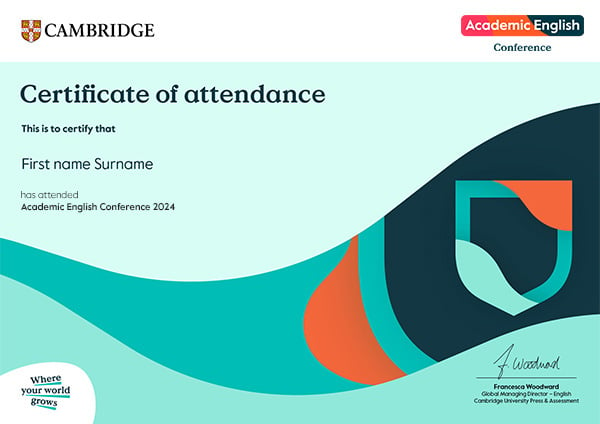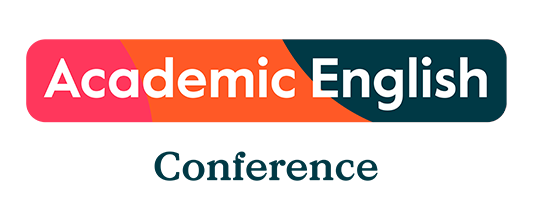
Join us for two days of exciting, brand-new live sessions
It’s the sixth year of our annual online Academic English conference and it’s back and better than ever.
If you’re an academic English teacher, professional or expert then this conference is for you! It offers you the opportunity to join like-minded professionals for two days of education, inspiration and interaction.
With sessions from ELT experts around the world, there really is something for everyone.
All talks are free to attend and are a great way to support your professional development. We listened to feedback from past attendees, and based on these invaluable insights have created a programme that delivers the most topical, relevant and useful content for you. Explore the programme and book as many sessions as you like!
-1.png)
Registering and watching is easy!
Registering is easy. Simply click the ‘Register here’ button and complete the online booking form. We’ll then email you the event details and Zoom invites to the sessions you’ve selected to watch. We look forward to seeing you there.
What to expect from the Academic English conference 2024
We’ll take a deeper look at:
The impact and role of generative AI in academic English classrooms, vocabulary development, innovative teaching methods for academic writing, and much more. You’ll have the opportunity to ask our experts questions at the end of each session.
You’ll experience:
Brand-new talks bursting with insights and practical tips for you to use in your academic English classroom. These sessions are perfect to support your professional development.
Conference Programme
Explore the Academic English conference 2024 programme. Sessions will be hosted on Zoom and links to talks will be sent by email once you’ve registered.
We have tailored the programme to different time zones to support academic professionals globally and to work around your schedule. All session times quoted below are in Greenwich Mean Time (GMT).
12 November 2024
04:00-05:00 GMT
Getting organised: Helping low level EAP learners write coherent texts
with Craig Thaine
Low-level English for Academic Purposes (EAP) writing programmes often focus on language accuracy with a specific emphasis on sentence-level grammar. While this is important, experts agree that a core learning need for these students is producing coherent, well-organised texts. This webinar will show how the adoption of a lite version of a genre-based approach can help low-level EAP learners with simple text organization and consider the role of Artificial Intelligence (AI) in academic writing programmes. The presenter will share a range of practical ideas and teaching tips throughout the session.
10:00-11:00 GMT
Academic English has a past and a present – but what is its future?
with Chris Sowton
2024 is the 50th anniversary of the use of the term ‘EAP’ (English for Academic Purposes). In comparing EAP provision in 1974 vs 2024, clear threads and similarities can be seen – but if we look ahead to the next half-century, the nature of change is likely to be seismic and fundamental rather than gradual and evolutionary. Hard as it is to imagine the EAP landscape in 2074, this presentation will consider some of the core aspects of the field and speculate on what could happen – for example, the digital tools employed, the language(s) used, the way learning is assessed, how content is delivered, and how ‘the teacher’ is perceived.
20:00-21:00 GMT
Light a fire through personalizing and localizing content
with Alice Savage
This session introduces three major shifts currently upending English language teaching: generative artificial intelligence, culturally responsive teaching practices, and genre-based projects. The intersection of these three developments potentially offers teachers guidance and resources for creating personalized content that can complement traditional unit topics. The presentation then addresses the what and the how of creating these materials with examples of modules, texts, processes, and activities.
13 November 2024
04:00-5:00 GMT
A critical question for EAP: How does vocabulary grow?
with Averil Coxhead
Learners with larger vocabulary sizes are usually more proficient than those with smaller lexical treasure chests. This talk focuses on why a large vocabulary is needed for EAP (English for Academic Purposes), how vocabulary grows and what factors affect its growth. We will also look at how teachers and learners can work on growing a larger vocabulary for EAP.
10:00-11:00 GMT
A creative and – dare I say it...? – fun approach to building academic writing skills
with Greg Archer
Join Greg Archer as he explores a fresh, engaging approach to building academic writing skills. Find out how a ‘light touch’ method can be used alongside innovative classroom activities to raise students’ awareness of style, tone, and academic conventions. By incorporating techniques such as backtranslation and embracing the positive contributions of AI, students can analyze and rethink their academic language use, resulting in an intellectually stimulating and surprisingly enjoyable learning experience.
20:00-21:00 GMT
Thinking Locally, Writing Socially
with Colin Ward
It’s hard to prepare our students for the expectations of “good” academic writing without asking what their future teachers value. In this talk, participants will hear the results of a study that compared the academic expectations of ESOL and non-ESOL faculty at a community college in the United States. The findings suggest a rethinking of 21st-century writing practices with lessons that prioritize localization, collaboration, and extensive reading.
A great line up of speakers...
.png?width=1664&height=2000&name=Craig_Thaine_NB%20(1).png)
Craig Thaine
Craig Thaine has worked in ELT for more than 40 years as a teacher, teacher trainer and materials writer in England, Italy, Egypt, Sweden and his native New Zealand. During that time, he has been an assessor for CELTA and Delta Teaching Awards. Craig is author/co-author of the following Cambridge University Press & Assessment publications: Teacher Training Essentials (CUP 2010), Cambridge Academic English Intermediate (2012), Cambridge English Empower (2015, 2022), Off the Page (2020) Teaching and Developing Writing Skills (2023) and Employability Skills (2023).

Chris Sowton
Chris Sowton has been working in the field of English Language Teaching for 25 years. He has worked for a range of institutions, including Cambridge University Press & Assessment and the British Council, and taught at institutions including Cambridge University and King’s College London (University of London). He has written extensively in the field, as author or co-author on more than 20 ELT books, including Unlock and Prism series and the recently published Teaching in Challenging Circumstances for Cambridge University Press & Assessment. He has conducted teacher training and educational research in many countries, including Lebanon, Jordan, Palestine, Nigeria, Saudi Arabia, India, Somaliland, China and Indonesia. He has an MA, a DELTA and a Doctorate, in which the main focus of his study was language-in-education policy. Further information can be found at www.chrissowton.com.

Alice Savage
Since earning a master’s degree in teaching from the School for International Training, Alice Savage has spent the last 30 years exploring language with and through her students. The journey has included authoring various course materials, but the ones she loves best are the reading and drama texts that engage teacher and learner through the discovery and sharing of ideas.

Averil Coxhead
Professor Averil Coxhead teaches undergraduate and postgraduate courses in Applied Linguistics in the School of Linguistics and Applied Language Studies, Victoria University of Wellington, Aotearoa/New Zealand. Her most recent books include Connecting corpora and language teaching (2022; Foreign Language Teaching and Research Press), Measuring the vocabulary size of native speakers (with Paul Nation; 2021; John Benjamins), English for vocational purposes (Routledge, 2020) and Reading for the academic world, a series of textbooks with Professor Paul Nation (2018, Seed Learning). Averil’s research interests include vocabulary for specific and academic purposes, corpora for language learning and approaches to teaching and learning vocabulary.

Greg Archer
Greg Archer is a Delta-qualified teacher and teacher trainer who has been involved in English Language Teaching since 2010. After moving to Cambridge in 2013, he worked at an international college there for eight years, at various times managing the English Language department, developing EAP and exam classes and teaching students whose ambition was to enter a UK/EMI university. He has written a number of coursebooks (and a wide range of study material) for Cambridge University Press & Assessment, and over the past decade has delivered talks, webinars training to teachers from all over the world.

Colin Ward
Colin Ward is a professor, materials writer and teacher trainer from Houston, Texas, USA. He received his MA in TESOL from the University of London and has published ELT materials with several publishers, including Cambridge University Press and Assessment. Colin has been a featured speaker at various local, national and international conferences and co-curates a successful ELT blog, EnglishEndeavors.org, where he shares his passion for bridging theory to practice.
Frequently Asked Questions
No, the event is completely free of charge. Explore the programme and book as many sessions as you like.
All our sessions are recorded and will be available to watch on our YouTube channel the week after the event.
You may need to check your junk folder, as unfortunately some of our emails end up there.
The speaker presentations will not be shared with attendees, but the recordings of each session will be available on our YouTube channel the week after the event, so you can view the presentation slides again.
No, you can choose to attend as many sessions as you like over the two days of the conference.
For each session you watch live, you’ll receive a certificate of attendance.
We'll send you an email after the event with a link to download your personalised certificates, plus access to all the recordings.
There will be a button on the screen to update your name before you print or download the certificate.

Receive a certificate of attendance
Attend any part of the Cambridge Academic English Conference 2024 and you’ll receive a certificate of attendance for your professional development. As we have thousands attending our event it's not possible to personalise certificates. Don’t worry though, they are editable so once you’ve downloaded them you can add your name in the area highlighted.
Register here
